Shakespeare in Black with Renea Brown
Daughters of Lorraine Podcast Season 2 Episode 3
Leticia Ridley: Welcome to Daughters of Lorraine, a podcast from your friendly neighborhood Black feminist, exploring the legacies, present, and futures of Black theatre. We are your hosts, Leticia Ridley.
Jordan Ealey: Jordan Ealey.
Leticia: On this podcast we'll discuss Black theatre history, conduct interviews with local and national Black theatre artists, scholars, and practitioners, and discuss plays by Black playwrights that have our minds buzzing, so please stay tuned.
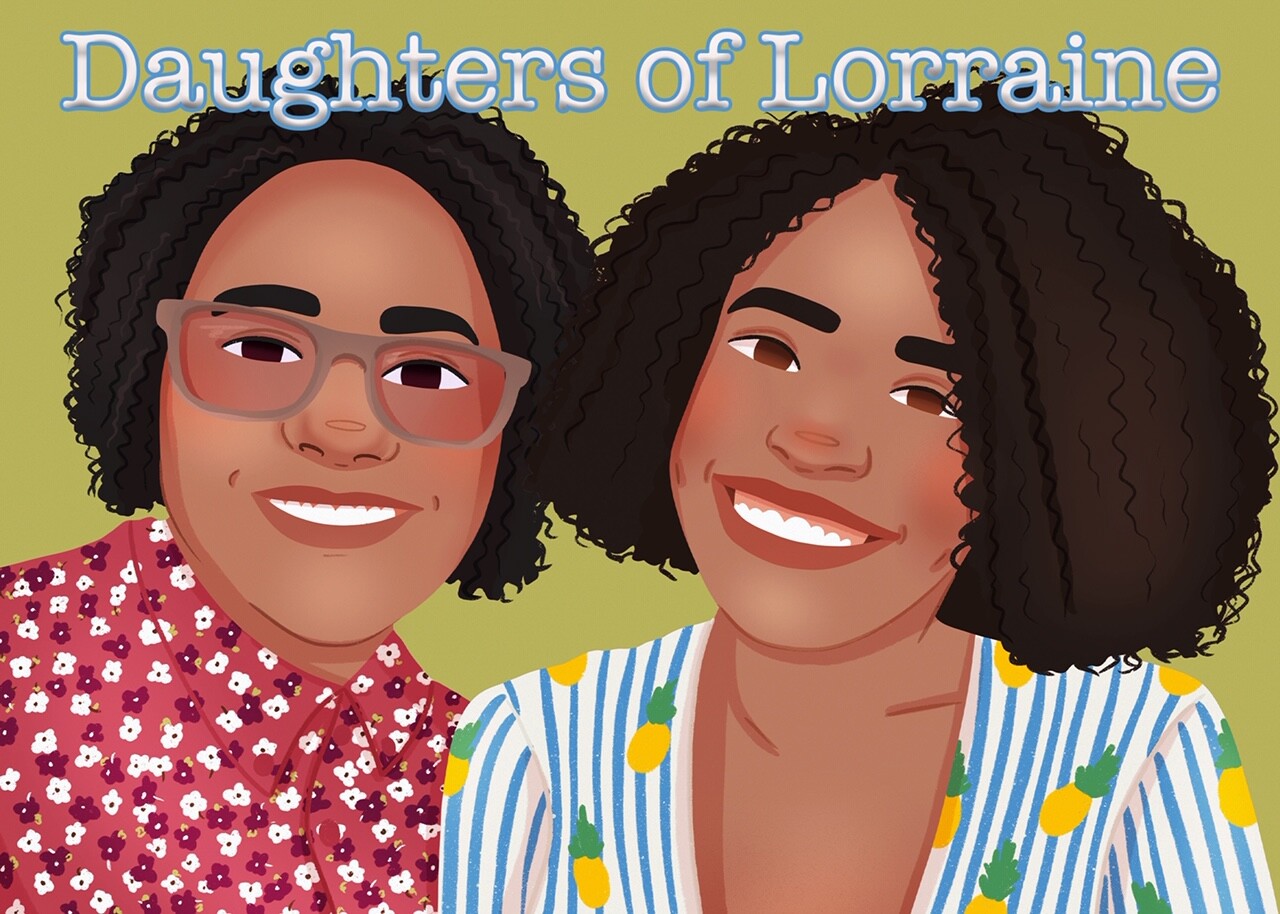
Daughters of Lorraine Podcast logo by Clarissa Bittes.
Jordan: For some, Black theatre and Shakespeare might appear to be incompatible, but in fact, Black theatre artists have had a long history of producing and performing Shakespeare, especially in America. The 19th saw the establishment of this tradition of Black Shakespeare with the founding of the African Theatre, America's first known Black theatre company, by William Brown. Formally opening on September 17th, 1821, the African Theatre was known for its Shakespearean productions, including Richard the Third, its inaugural show, and Macbeth. Black actors from Ira Aldridge to Ruby Dee among others are part of a tradition established by the African Theatre, a tradition carried forth by today's guest, Renea Brown.
After it stopped becoming, "I have to do it because you said no," it became a thing of, "I have to do it because I love it, because I've said yes, I've chosen for myself. This is going to be the thing that I do."
Leticia: Renea Brown is from Lexington, Kentucky, where she began studying theatre at a performing arts school. She graduated with a theatre degree from the University of Louisville in 2014 and earned an MFA from the Academy of Classical Acting at George Washington University in 2019. Renea has played in over 30 Shakespearean roles, including Cassio in Othello at Island Shakespeare Festival, where she was the first Black woman to perform at the festival. We sat down with Renea to discuss the interactions between Black theatre and Shakespeare, as well as her experience as a Black Shakespearean performer. Later in the episode, the three of us have a conversation about the public theatre's 2019 production of Much Ado About Nothing in Shakespeare in the Park. Directed by Tony Award winner Kenny Leon, the show features an all-Black cast, most notably Danielle Brooks and Grantham Coleman as the sparring lovers. Please stay tuned.
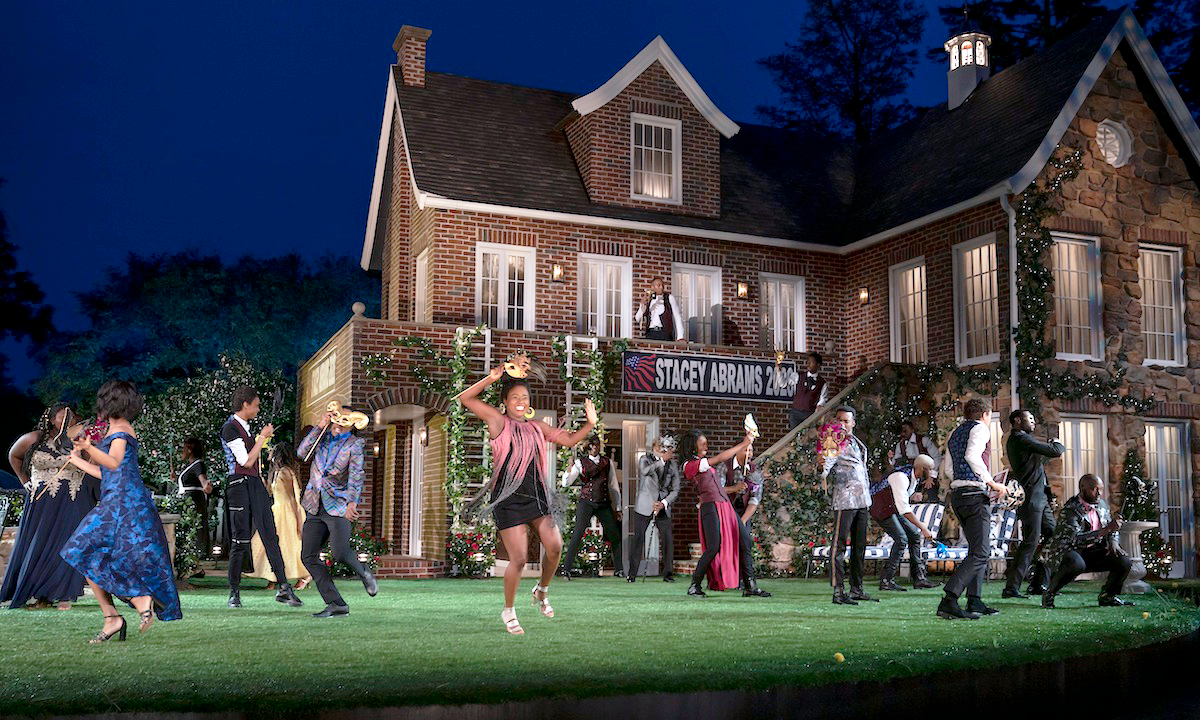
Shakespeare in the Park's 2019 production of Much Ado About Nothing. Photo by Joan Marcus.
Jordan: All right. Thank you so much for joining us today, Renea Brown. Renea is a Shakespearean actress with tons and tons of experience, as you heard in her bio. We are so delighted to talk to Renea today.
Leticia: Yes, bring this down to the nitty gritty of Shakespeare while Black, Black Shakespeare. We are so delighted that you are able to join us to have a conversation about Shakespeare and Black theatre, where it converges, where it diverges, and what does it mean for Black theatre today.
Renea Brown: Thank you all for having me. I'm very excited.
Leticia: How did you get into Shakespeare?
Renea: Realizing the older I get how much my childhood influenced everything that I'm doing. I'm one of five, four girls and one boy. I'm older than my brother. My brother and I I think are the most rebellious out of our group. You know how your mom will tell you no or, "No, we're not doing that. No, we're not going here." Everybody was on this, "Yes, ma'am." I was like, "Why? How come? Why did you say no? How come I can't go there?" There is a grace that my mama has and then there's a limit of, "Because I said so." That's the limit.
"I'm the mama."
Leticia: Yes, "I'm the mama," is a Black mama mantra.
Renea: My daddy was more lenient. That sort of spirit led into everything else that I did. When someone started to tell me, "No, Shakespeare isn't for you. No, you couldn't, you wouldn't, you shouldn't use Shakespeare. Have you read Raisin in the Sun? Have you studied August Wilson? Have you read August Wilson?" Anytime anyone tells me no, I then must do the thing. I have to. Sometimes that's gotten me into trouble. It's the stove. It's the stove. We see a blue fire and we go, "What's that? Don't touch it." Eventually you're going to get burned, because you're going to be interested.
That was my bittersweet start to Shakespeare, because I had people telling me, "It's not going to be beneficial for you. If anything, you'll play servants, gentlewomen, spear carrier number two." They were right, I have played those roles. Everybody has to start there. At first it was about proving people wrong. It wasn't until college when I had taken a Shakespeare class, and I was like, "Whoa. If I actually take the time to read all of these stories, everything that I'm interested in is in this. There's vengeance. There's murder. There's love. There's baking kids into a pie." That's my favorite play, Titus Andronicus. Usurping, there's hierarchy, there's rebellion. Those things are so interesting. Now I'm wondering, "Why wouldn't anyone want me to be interested in this?" That was the drive. After it stopped becoming, "I have to do it because you said no," it became a thing of, "I have to do it because I love it, because I've said yes, I've chosen for myself. This is going to be the thing that I do."
Jordan: That's so compelling. The way you talk about Shakespeare, admittedly, Leticia and I are appreciators of Shakespeare, but I wouldn't call us experts by any means.
Leticia: Am I an appreciator of Shakespeare? Let's be real. My birthday's April 23rd, which apparently is the same day that Shakespeare was born, so apparently we share a birthday. Let's just say me and Shakespeare have a relationship that's a non-relationship.
Renea: It's in there.
Leticia: It's there. Graduate school really opened me up to exploring more of his works beyond Romeo and Juliet, which I read in high school. Then I started going down the rabbit hole of, in particular, Black women writing about Shakespeare and thinking about Blackness and race and conversation with Shakespeare. What's so interesting to me, and like Jordan said, compelling, when you're talking about these things at the center of Shakespeare's story that oftentimes seem uninviting to Black people in general, so possibly can't embody murder or vengeance, because of the way that iconography circulates in the way that it does, so I think it's so compelling, think about what happens when Blackness enters Shakespeare and the frame in how it shifts and changes and challenges Shakespeare himself.
Jordan: That Shakespeare couldn't imagine when he was writing that. I think that's what the beauty of what has happened with Black theatre and its interactions with Shakespeare and the ways that they're able to excavate things from the text that Shakespeare couldn't have even imagined, and beyond Othello—
Renea: Exactly.
Jordan: —these different plays. I love hearing you talk about Shakespeare. That really brings me to my next question, which is how you approach the artistry of Shakespeare. Was there a text that really just grabbed you from Jump Street or was your training a part of that? What is the way that you approach being a Shakespearean artist? I would love to hear more about that.
Renea: Let's get real. You know about code switching. You know about wearing the mask. At times I feel like that is the training, because how we talk, how we're talking now versus if we were in a job interview it's going to be very different. With Shakespeare, I could always understand the stories. Nobody really had to break that down for me, which I feel like is the first thing that distances people from Shakespeare, because they think they can't understand the language. Pick up a Bible, read a verse. It's the same thing. It is. It is. I didn't understand the Eurocentric cadence, the stanchion. I didn't understand that, because we innately have our own rhythm. It is just ingrained in us. When we sing, when we dance, when we talk, I don't think we notice how much of a performance it is.
Side note, during the pandemic, I started writing a little bit. I wrote this scene with this couple. I was like, "Oh my god, it's a performance that we do." When we hype each other up over, "How'd your presentation at work go?" "Girl, let me tell you. First of all, you know I wore that red dress, right? Then I was standing up like boopty boopty boo, and what I do, I hit them with the sales pitch. Okay!"
It's a whole performance. I don't know if we realize that we're doing that. That's always been my main entrance is I know what my rhythm and music is in my speech and how it makes me move physically and how it makes me sound. That is the culture. That's our culture. Then there's an immediate halt with that, where it's like, yes, you're different, it sounds different, but now we need to polish it, I guess.
One of those examples is, I'm from Kentucky. Some people are like, "Oh, I didn't realize that you were. I didn't hear anything." That's because it's been beaten out of me. When I go home it comes back, whoever I'm surrounded with. Even things like that, shifting the way you speak, the way you stand. Of course it's healthy to stand upright or whatnot, but there's a difference between standing and commanding the space versus parking and barking. I have to find a way to incorporate both, because one of them I can turn off, the other one I can't. Trying to make those things mesh is how I like to approach. Did I answer the question?
Leticia: Absolutely. Absolutely. Absolutely. I think what you're getting at is this negotiation, that you have to negotiate when you are performing Shakespeare. Also, like you said, this code switching that you actually have to negotiate in your entire life and thinking about how Shakespeare, or at least how you approach Shakespeare in a way that marries who your are and your way of being in the world, because it's really, really compelling. What I want to ask now is what is it like performing Shakespeare as a Black woman? What are some productions that you've been a part of? Has there been productions that have allowed you to incorporate the rhythm of Blackness or the corporeality, the way that we move, the way that we talk, or has it been this training around, like you said, being upright, being polished? Let's just hear a little bit about that.
Renea: My younger self, I made it a lot about me. What roles am I going to play? How much stage time do I have? What theatres can I bust my ass at, interning and doing everything else for them to notice me? How can I get ahead? Also, the love of the work, but it was very much about me.
When I came to the D.C. area, I lived in Virginia, but I primarily work in D.C., that was the first time that I walked into a classroom. I'm also an educator. I also teach Shakespeare and acting. The first time I walk into a classroom and I see all Black kids. I'm like, "This is unreal. What?" There's a Black principal. There's Black teachers. That is not something that I had. I was not exposed to that. I had one Black teacher, fifth grade I think.
Teaching these students made me realize, oh, it's actually not about me, it's about them. I would teach anywhere from middle school to high school, but what really shifted for me was some of these juniors and seniors, when I asked had they ever seen a play before, and they said no. Therefore, they've never seen a Shakespeare play before. Students who had seen a Shakespeare play before said that there were enough Black people in it. I was like, "This is where it's interrupted." This is where Shakespeare and Black people are separate. Where is the middle man? Where is the person saying, "Oh, I do it, and this is how I do it. You can come see me in a play," or, "Let me teach you how to do it if you're interested." That middle man, that person is missing oftentimes, I find.
It stopped being about me and it started being a responsibility. I'm not saying I'm the only Black woman doing Shakespeare, but I take it on as if, if they aren't seeing me, then who is it? Someone has to do it to let our generation and let their generation under them, let them know we're limitless, there's nothing that you can't do. Shakespeare is one of those things that we limit.
It became a responsibility. I have to get their butts in the seats. I have to get their family to come see the shows. Then it became a thing about paying homage, because the more and more research that I had to do myself, because no one was talking about Black people historically, as far as their connection to Shakespeare, other than Ira Aldridge, I'm doing this research and I'm like, "Damn, so they really told a group of actors ... " Okay, so you're familiar, yes, yes. How you going to take actors and put them in jail and say, "The only way you can get out is if you promise to never do Shakespeare again." How petty. That's how you know how much power you have on that stage, and whatever this golden nugget of Shakespeare is that they don't want you to touch. I think to myself, if there were people willing to say, "Yeah, I won't do Shakespeare anymore. Please just let me go," then I better bust my ass working, and working on the stage, because without them I would not be doing it.
We have our own ancestors, and I've adopted my own ancestors. I've adopted Ira as my ancestor, Henrietta V. Davis, James Hewlett, Paul Robeson. All of these people, I'm like, "They did it so that I could do it." It's responsibility and paying homage now.
Jordan: Absolutely. I love that you brought that up. For those of you listening who may not be familiar with what she is discussing, the African Grove Theatre by William Brown in 19th century New York had probably what is known as the first Black theatre company, at least known, in the United States. They performed a production of Richard the Third and they got arrested for it. Put in jail, you all. Locked up. Closed the doors.
Renea: Not even like, "Okay, we'll let you go if you pay a fine. You'll have to file this paper," whatever. How petty. You have to swear—
Jordan: Just don't do Shakespeare. Just don't do Shakespeare, please.
Leticia: I love that you point out this idea of it being a moment of illustrating the power that Black theatre, Black artists, Black actors can have touching Shakespeare, the god, the thing that Blackness is not supposed to touch, I think is really compelling.
Jordan: It reminds me of, we talk about this in other episodes, but the FBI watching.
Leticia: Lorraine Hansberry.
Jordan: Lorraine Hansberry and Alice Walker and all of these people, like, "If they go see their plays, they're going to start a uprising." If that doesn't speak to how important and how much Black theatre and Black performance can do for the world, it's not just entertainment, I don't know what does. I also appreciate you shifting to thinking about the interaction between Shakespeare and Black culture as not necessarily just seeing something on the stage, but what happens in a classroom. I wonder if I would've developed a different kind of relationship to Shakespeare had I had a teaching artist like you when I was a kid, or even in middle school, or even in high school. I studied both English literature and theatre as an undergrad. I took a lot of Shakespeare classes. I don't think that I talked about Shakespeare and race except for in Othello and in Merchant of Venice with Shylock.
Renea: I see.
Jordan: The Jewishness and that. I find it very compelling to think about the different ways that we are barred from Shakespeare, the different ways that we are institutionally trained to think that we don't belong in those spaces and that we shouldn't study them and that it doesn't include Blackness or it doesn't include people of color. I think about that.
Leticia: Even popular depictions of Shakespeare in popular media, all the movies that are basically Shakespearean stories just... for the contemporary moment, I'm trying to wrack my brain to think of one, there is one, but a Shakespearean retelling in our contemporary moment that is told from the perspective of people of color. The only one I can think of, and the only reason I know this is because I was an athlete, was O, which was based on Othello. That's the best film.
Jordan: We actually do have a contemporary Black cultural product that is based off of Shakespeare. Empire.
Leticia: You are right!
Jordan: It's based off King Lear.
Renea: King Lear.
Leticia: It's true. It's funny that you bring up ... It's not funny that you bring up Empire, but it's interesting that you bring up Empire, because the way that Empire exists within cultural conversations is that it's low art, that it's a soap opera. In a way that's counter-intuitive to how we think about Shakespeare's story, at least in our contemporary moment.
Jordan: Which aren't soap operas.
Renea: Yes. Kids are the greatest beings on this earth. I usually have these moments. I didn't think that I would really enjoy teaching. I was also doing it to make money. That's real. That's a struggle. My favorite students are the ones who give me the most resistance or the most backlash. Sometimes I have these conversations of, "Oh, you think you fancy coming in here with your Shakespeare." I'm like, "Okay, yeah, I'll go ahead and let you clown me. I'll let you have this moment." They are the best students, because there's a reason why they're hesitant. Different students have different stories. They usually end up being the leads of whatever scene or whatever show we're doing. Like I said, everyone understands this work. Someone just has to tell them, "You do understand it." I also don't know where that comes from. Who tells us, "Oh, it's so hard," or, "Oh, it's a lot of words. It's stuff you won't understand." I don't know who tells us that. They become my favorite students. They find the things in the text where I'm like, "Oh, I didn't even think about that."
One class I had in D.C., maybe it was at Ballou, I can't remember the school, but we were talking about As You Like It. Rosalind has this scene with Phoebe where she's telling her, "I'm not into you. I don't find you attractive. Leave me alone. Marry this shepherd. He loves you," all this stuff. The reason why one of my favorite lines comes out of this play is because of the way the student said it. I had never heard her say it. She's talking to Phoebe and she goes, "Sell when you can. You are not for all markets." I went, "Oh my god. That's how it's supposed to be said. That is how the..." I had seen As You Like It, and it comes out the same way, "Sell when you can. You are not for all markets." The way she just tilted her head and said it, I said, "Oh my god. That's the key." It's moments like that where I'm like, "Yes, we're doing the right thing. Yes, there's power through us, through this text." That has become my favorite line in that play. If I ever get to play Rosalind, that's how I'm going to say that line. She was just one of the students who was very resistant to the process. The master learns from the student.
Jordan: I really appreciate you bringing that up, because before we shift into talking about Much Ado About Nothing, I would like to hear, because you said that, I love that anecdote so much, and now when I read As You Like It, which I'm not planning to in the future, but perhaps I will, and I read that line now, I'm just going to start thinking about that. I would really like to know, what do you, in your opinion, Renea, think is the relevance of Shakespeare to Black theatre?
Renea: This is a heavy question. I think it's the transformation. The Shakespeare is the transformation or the shift, because we have to start relearning what we think classical work is, what we think Shakespeare is. We think classical, we think white, Eurocentric, white men. Shakespeare has shifted. Shakespeare shifts the way that he writes. You can tell the difference between Titus Andronicus and Comedy of Errors versus The Tempest and Hamlet. All of them are his plays, but he's shifting. He's getting older. His writing is getting better and more dense. He's shifting through his text, his stories.
His players are white men. We get to maybe late 1600s, and a white woman is now able to perform Shakespeare. Then we shift further to 1800s. Ira Aldridge is performing Shakespeare, not all the time in traditionally white roles, but we know him mainly because of Othello. There's a shift happening. It's just happening in long spouts of time. I think that that's how it's relevant to us now. We have to keep pushing the shift.
If we see a cover of, I'll say Romeo and Juliet, and there's a Black Juliet, we automatically assume this has something to do with race, as opposed to this was the best person for the job, this Black person playing Juliet. I think that is the relevance is its purpose is the transformation. When do we get to a point where we're going into theatre not assuming a concept just because we see Black bodies on the stage? We have to instill that in our further generations, like I was saying earlier.
Now that these articles are coming out about Beethoven and people are like, "Beethoven?" We're just now hearing about it, that Beethoven is assumed to be Black or half Black. I'm not really sure. That's a transformation for us. Maybe now other people who weren't interested in Beethoven at first are like, "Let me see what this is about, now that I'm pulled in." I think we have to do the same thing with this next generation, this next cycle, get them into the theatre, get them in to see the shows, get them in to working backstage or directing or doing costumes. A reminder that we are limitless. I think maybe that's the answer. That's my answer.
Leticia: For our listeners that don't know what Much Ado About Nothing is about, Renea, would you like to give a quick rundown of what it's about?
Renea: Yeah. These men come home from the wars. The main story here is Hero and Claudio are going to get married. Beatrice is Hero's cousin. There's excitement around this wedding. Beatrice and Benedict are spars of wit. It's very much the battle of sexes between them. They enjoy this banter, and everyone around them enjoys it too. With love in the air and a wedding's happening and everything, people get the idea, "Let's make them fall in love. Let's talk about Benedict while he's listening to us and say just how much Beatrice just loves him, and the women will do the same thing with Beatrice and talk about how Benedict just loves her." Their plan is, "Then they'll fall in love. Then we'll be done with the back and forth." That happens, and the plan goes through. What they don't see is Don John, who we'll call the villain of the play, who sets it up to where Claudio is to believe that Hero has been cheating on him, has been seeing another man. This fool waits until the wedding. You start to think about these stories, like, "What would I do in real life?"
Leticia: Not wait until the wedding.
Renea: The first thing out of my mouth would be, "Dang, you couldn't tell me this two days ago? We could've talked about this two days ago." I digress. Claudio calls out Hero during the wedding. Leonato, played by Chuck Hooper, who Leonato has some of the best language in that play, and Chuck Hooper, he does a lovely, lovely job, just the pain in him, but also him making the choice to say, "Let her die. She deserves it. She brought this on herself." The plan is, "Okay, we'll pretend that Hero's dead." She passes out in the wedding. "We'll pretend that Hero's dead and learn more about what really went down here." She says she's innocent. At this point Benedict and Beatrice are, I'm trying to think of a word, I don't want to say casually dating, but they feeling each other right now at this point. Benedict says, he expresses how upset he is and that he's here for Beatrice, what can he do. She says, "You can kill Claudio." Boom. Now I have to choose between—
Jordan: Death? You got to kill him?
Leticia: A wam line if I've ever heard one, Shakespeare.
Renea: "You want to show me how much you love me? Oh, okay. Go ahead, kill Claudio."
Leticia: That's my favorite line where she talks about, "If I was a man, I'd eat his heart in the marketplace."
Renea: In the marketplace, yes. See, and the way that she says it, the way she delivers it. The audience was like, "Ah!" That's his homey. I can't remember if they're homeboys or if they're cousins. Everybody's your cuz—
Leticia: They're cool. Established relationship. They're cool. They joke around.
Renea: Benedict says, "Okay, I'll do it." Woopty woopty woo, there's a whole lot of he said, she said. There's a dog buried. Those are other storylines. Eventually everyone finds out that Don John was lying. Claudio and the prince go to the tomb, the sepulcher, where Hero is supposedly buried. He asks for her forgiveness. Leonato says, "I'll tell you what you can do. You can marry a niece of mine that I have, to make it up to me." He says, "Okay." We get to this wedding. It ends up being Hero. Everyone is like, "Yay, this is perfect." Then Benedict and Beatrice are there. Benedict's like, "Do not you love me?" She's like, "No more than reason." He says, "I could've swore that Leonato and Claudio, all them was talking about how you love me." She was like, "Don't you love me?" He was like, "No more than reason." She's like, "Then my cousins Margaret and Ursula have deceived me." They find out the trick that has been played upon them, although they realize, "I do love you." They do get married and there's celebration and all is well. The only thing that's, not awful, but the only thing that sucks is that Don John does not get punished. He's ran off. We forget about that, and let's dance.
Jordan: Let's sing, lift every voice and sing. Thank you for that. Thank you for that synopsis. That was great. That was better than we could—
Leticia: I know.
Jordan: —have ever given that. We started talking about it a little bit during the synopsis, but women, gender. We talked about being invested in Black feminism on this podcast. Some thoughts about Beatrice and about Danielle Brooks's embodiment of her. What do we make of her in this production?
Leticia: I think in particular what's so potent to me about Danielle Brooks as Beatrice is actually her foil, or the way that I read her foil, which is Hero, this woman who is desirable, that is deemed as worthy of marriage in a way that Beatrice is not. She's the unruly woman who—
Jordan: Smart.
Leticia: —is smart—
Renea: Witty.
Leticia: —witty, who doesn't desire, who doesn't actually desire marriage, is like-
Jordan: What?
Leticia: Everyone's like, "Don't mess with Beatrice over there." I think what Danielle Brooks brings to her portrayal of Beatrice is just such a nuance and such a self-assurance within the character, in a way that we don't read her as someone who is lacking. To me when I seen her portray her, I was like, "Oh, she's actually very fulfilled in her life." Even at the end of the play, when she gets together with Benedict, it's something extra, it's something on the top. It's not necessary, something she needs to fulfill her life.
Jordan: It's not something she's settled for. I love rom-coms. Leticia knows this. For you, Renea, and all the folks listening to this, I love rom-coms. This is one of the original rom-coms. Shakespeare basically invented the genre of romantic comedy. What I love about this is the fact that, unlike a Hallmark movie, Beatrice is not settling for Benedict. In fact, in this production, and not to give it away, it ends bittersweet. They get together, but then all the men are-
Leticia: The war.
Jordan: The war breaks them up again. I thought that was such an interesting choice made by possibly Kenny Leon and other creative collaborators, and thinking about the disruption of Black social life or thinking about Shakespeare in ways that are relevant to Black culture. I appreciate thinking about Beatrice as the romantic heroine, because Danielle Brooks talks about, "I was so happy when I got cast as this, because as a plus-size, dark-skinned Black woman, we're not taught to believe that they are the romantic heroine." Here she is, the star of the story, and she gets the guy, but she still doesn't though, because literally immediately they're torn apart.
Leticia: She gets the guy also without having to shift who she is, without making concessions.
Renea: He has to meet her at her level.
Leticia: Absolutely.
Renea: So much that you just said. Danielle is a Energizer bunny that never turns off. If you haven't seen the show, I'm not saying that she is just bouncing all over the place, because there are moments that she has where you can see that she is fuming, but she is taking her time. She's grounded. She's graceful. She turns up with her cousins. They dance. They do all this stuff. We never see her take a break. She is driving that show. We never see her take a break. She just moves it along. What you were saying about, at the beginning, they're marching in with these posters, and going back to what we were talking about, the relevance of Shakespeare and the Black theatre, we do have our own stories about our experience, whether we are experiencing joy or pain, because we know we have experienced a lot of pain. This was a key moment for us to see people marching with signs, even in a time where we want to vote for Stacey Abrams—
Leticia: Stacey Abrams.
Renea: —in 2020. We know where we are. We're in the current time, but we're still marching with signs in our hands. One of the signs caught my attention. It said I'm A Person. I was like, "I'm A Person, I'm A Person, why is that sticking in my head?" It's sticking in my head because of all the pictures I saw during Civil rights, not that I was there—
Leticia: I Am A Man.
Jordan: I Am A Man.
Renea: When you're studying, the I Am A Man. I understand again this transitional shift of not everyone identifies as a man or a woman. We as a society are shifting. We're shifting our lives. That's what I was talking about shifting with Shakespeare. Now the sign says I Am A Person. The fact that we're still doing that, that we're still marching, that we're still going to war, and seeing what's going on and the end of the show, really pulls you in, especially with our experience, our culture. I thought that that was really well done. You talked about them being separated, and immediately my mind will just go off on its own little tangent, but by my mind's like, "Oh my gosh, separation. Separation of the Black family. Pulling the man away." Yes, he's going to war, but no matter if it's war, if it's slavery, whatever, you don't know when you're going to be pulled away from your loved one. That's something that has been in our culture. You don't know when you're going to be pulled away. That was the tangent that my mind went off on.
Jordan: I think that's great, because I think that you touch on something so important, which is this idea of the unknowns of Black life in this country. We're watching this in 2020, which where the play is taking place or where Kenny Leon chose to set it, and we're dealing with these uprisings that are going on in the midst of a pandemic that is disproportionately affecting Black, Brown, and Indigenous communities. You see that and it's like, for Shakespeare or for maybe white actors, performing Shakespeare is a Tuesday. Performing these things is just so mundane in the span of their lives. This isn't just a Tuesday for these actors. One, there's not many all-Black Shakespearean productions that are happening at Shakespeare in the Park.
Then two, it's not just a romantic comedy, because again, we know, like you just beautifully pointed out, Renea, that at any moment it can be interrupted, whether it's by police brutality, mass incarceration, like you said, slavery, all of these different things. I think that Kenny Leon doesn't eschew those facts in this production. We have the joy and we have the celebration, we have the song, we have the dance, we have all of these wonderful, beautiful things, but when they sing Lift Every Voice, sometimes it doesn't necessarily sound like a celebration. It sounds like a mourning. It's how Black people call funerals home-going services, where this is a tragedy that they are gone, but wow, what a life they lived. I think that that's something that is brought into the frame in Kenny Leon's version of Much Ado About Nothing. We know joy because we know pain. I really appreciate that, that it's not just a fluffy romantic comedy, although again, rom-com queen here, I love a good romantic comedy.
Renea: Rom-com queen.
Jordan: I am the rom-com queen. I really do appreciate that Kenny Leon's like, "You're not just going to come and watch Black people fall in love. You're going to watch that and you're going to watch the ways that state-sanctioned, systemic, structural things stop them from fully experiencing the breadth of that love."
Leticia: What I appreciate about Kenny Leon and his direction in this production is that for me it didn't feel like I was watching Shakespeare. This is not to say Shakespeare doesn't offer us anything, even if it's done traditionally, but to say there's just something fresh in it, there is a way that I could enter it, perhaps because my entrance into the story is Marvin Gaye's What's Going On. For me as a Black audience member, there's a way that I'm being invited into the space in a way that I may not always be invited into traditional theatre spaces watching Shakespeare. It really acclimates me that no, this story, to a certain extent, centers on Black people, even as the creator of the story wasn't Black, in a way that I feel like Kenny Leon's attending to. That's not saying that other non-Black people can't watch and enjoy the show, but what does it mean that their experiences may not be centered. We see that in just small touches. Like you said, the protest signs at the beginning, the music, the dancing that happens at the wedding.
Renea: Jumping the broom, pulling the broom. It is incredible how, you talked about this when you were talking about What To Send Up When It Goes Down, and how we're told, "This play is for Black people. Please, at your leisure, come and see the show. Just know that it isn't for you, but we welcome you to witness it." I feel like the moments, those moments that he has in the play, like you said, it makes me go, "Oh, okay, so this is for me. Oh, this is about me," because I don't know how often ... I don't know. I'm not white. I've never been white. I don't know what that experience is when you see someone pull up a broom, and without speaking, only with movement, with dance, with drums, we know what that means. We know what it's for. It is a call out. That is the call, and we respond with yes, jumping the broom, yes, we're getting excited for this wedding.
I was watching Project Power last night on Netflix, and there was a text message sent where they were like, "Where do you want to meet?" Two emojis were sent. It was a picture of a church and a picture of a chicken. I was like, "Oh!" It's just moments like that where you're like, "This thing is mine. This Easter egg, this play, this story is mine. Whether or not it was written by someone who looks like me, that doesn't matter. It's mine now. I'm claiming it."
Jordan: I read this really great article by Soraya McDonald, who she is a theatre critic, film critic. She wrote this wonderful article comparing three plays that were Black productions that were going on at the same time. I think it was Fairview, this production of Much Ado About Nothing, and Toni Stone. She talks about how the white gaze is either interrogated, ignored, or played into within these three shows. When she talks about Much Ado, that's actually the example of how the white gaze is completely ignored. That has stuck with me when I watched this where I was like, "Wow." It is. This is Shakespeare. The text has not been altered in any way. They are saying the words as we understand it to be written by Shakespeare, but they're doing so in a way that is using the cadences, the musicality, the rhythm of Black culture. That to me is what makes this production so Black. It's not Black people pretending to be, I think Marvin McAllister has the term stage Europeans, where essentially Black artists or people of color, actors, will not necessarily change themselves to be white, but are essentially—
Leticia: Mimicking.
Jordan: —embodying some experience of whiteness through—
Renea: There's an expectation that you have to meet.
Jordan: —exactly. You're supposed to have a British accent. You're supposed to have all these things. What I appreciate so much about Much Ado About Nothing, the Kenny Leon version, is that none of that is there. None of that. Like you said, these lines that I never would've understood in just simply reading the text or even in watching that film adaptation that I watched, I get it here. I know what these things mean, because Danielle Brooks is saying it in a way that my homegirls say or it or like I would say it or like my cousins would say it. There's a level of familiarity that we're allowed through this production that, admittedly I haven't seen a ton of Shakespearean productions, but I never, ever would've understood, I feel like, the mechanics of this play had Kenny Leon not freed it from these constraints that I don't know have been put onto it or that we put on it or whatever it is, but I really enjoyed this production. I would love to teach this production.
Leticia: Ayanna Thompson talks about, in some videos that the public distributed to give context around this production, she talks about she's seen Much Ado many times, and she said she's actually never seen a production where Hero is allowed to be angry. She said she's actually seen a lot of—
Renea: Oh my gosh!
Leticia: —productions where she's this passive, pleading, and she's not allowed to embody her anger. This is also the first time she's seen Hero as a Black woman, so what does that mean that Hero's allowed to embody this anger in a way that is not traditionally seen for her character, but also being told from the body of a Black woman. I think it just speaks to what you're saying is how Kenny Leon is breathing different light, different perspectives in our contemporary moment, that I think really speaks to the potential, the possibility of Shakespeare when it meets Blackness in particular.
Renea: Margaret Odette, who plays Hero, you're absolutely right, she goes through all these layers of joy, happiness, surprise, hurt, fighting for her lover, fighting for her husband, fighting for herself, pleading, begging, proving. You're absolutely right, it's so easy to fall into the trap of playing the end of the scene too fast, the, "I know he's not going to come back to me. I'm down. My father is ready to just let me die here." She does not go down without a fight.
Leticia: Before we go, where can folks find you? Where do they connect with you?
Renea: My Instagram handle is therealdarklady, T-H-E-R-E-A-L-D-A-R-K-L-A-D-Y. That's a bit of homage to the Dark Lady of the Sonnets. I'm a little obsessed. That's my Instagram. I also make Shakespeare gift boxes. Sometimes people are like, "I don't really know what to get someone for a show or for a birthday," an actor or something. I make those. That website is boxothbard, Box O' Th' Bard, dot com. You can find me there. You can email me there. I think my email's on my Instagram if you want to email me too. I love talking to people about this stuff, as you can see. I'm sure I've talked you all's heads off. That's where you can find me.
Leticia: Great. That is so cool. The Shakespeare box is so cool. I hope that people will get the Box O' Th' Bard. Also, what a fantastic name.
Renea: Thank you.
Leticia: As is customary here at Daughters of Lorraine, we want you all to continue to learn. We want you to continue to engage. We want to close out this amazing episode by recommending some texts and some plays and some productions that will aid you in your further engagement with race, Blackness, and Shakespeare and Early Modern. Renea, as our guest, we would love to hear your recommendations.
Renea: I would highly recommend the Royal Shakespeare Company's version of Hamlet, which you can find on YouTube, directed by Simon Godwin. It stars Paapa Essiedu. Brilliant. Brilliant. I saw it at the Kennedy Center when it came and was just blown away. It is set in Africa and I will leave it at that. Really fantastic production. He's also the first Black actor to play Hamlet at the RSC.
Leticia: Wow.
Renea: Shout-out to Paapa. Then the book I would recommend, I'm reading it right now, it's called Shakespeare in Sable by Errol Hill. It is a dive into the history of Black actors and Shakespeare, the history outside of Ira Aldridge, other people here in America and abroad. It's a fantastic read so far. I would recommend those.
Leticia: Thank you so much for recommending. For plays, we recommend The African Company Presents Richard the Third by Carlyle Brown, Une Tempete by Aime Cesaire, which rips off of Shakespeare's The Tempest, and Desdemona by, dot dot dot, Toni Morrison. Bet you didn't know that. Some of you might have.
Jordan: Then some critical texts that we would like to recommend are White People Do Not Know How To Behave At Entertainments Designed For Ladies and Gentlemen of Color: William Brown's African and African American Theatre by Marvin McAllister, aka the best book title of all time.
Leticia: The best book title.
Renea: I have never heard of that.
Jordan: It talks about the very thing that you brought up in the earlier episodes about the African theatre. If you want to learn more about that, Dr. McAllister's book is absolutely fantastic. Then two other texts we have are Things of Darkness: Economies of Race and Gender in Early Modern England by Kim F. Hall, and then finally Passing Strange: Shakespeare, Race, and Contemporary America by Ayanna Thompson. Kim F. Hall and Ayanna Thompson are both fantastic Black women who research Shakespeare, so all of their work is going to be relevant to you all.
Leticia: Also, if you're on Twitter, if you're on social media, look at ShakeRace. Or RaceShakes?
Jordan: No, ShakeRace.
Leticia: ShakeRace.
Jordan: #ShakeRace. That is a hash tag developed by scholars of color who research Shakespeare. They often tweet under that to talk about race, Blackness, and its interactions with Shakespeare and other Early Modern texts. I also wanted to quickly highlight the African American Shakespeare Company in California. Absolutely. They are a theatre company that is dedicated to Black Shakespeare. Check out their work. Follow what they're doing. I believe they have some digital programming going on. Just keep the conversation going. Thank you so much, Renea, for this fantastic conversation. I've learned a lot. I don't know. What about you, Leticia?
Leticia: I might just turn around and be a Shakespeare scholar tomorrow! You never know!
Renea: Thank you all for having me. I feel like we've been at brunch, just kicking it.
Jordan: Yes. Follow Renea. Follow her work. Get you a Shakespeare box.
Leticia: This has been another episode of Daughters of Lorraine. We're your hosts, Leticia Ridley.
Jordan: Jordan Ealey. On our next episode we will discuss the history of racial reckonings in the American theatre industry and its contemporary relevance for our current political moment.
Leticia: The Daughters of Lorraine Podcast is supported by HowlRound Theatre Commons, a free and open platform for theatre makers worldwide. It's available on iTunes, Google Play, Spotify, and HowlRound.com. If you're looking for the podcast on iTunes, Google Play, or Spotify, you will want to search and subscribe to HowlRound Podcast.
Jordan: If you're looking to connect with us beyond this podcast, please follow us on Twitter at dolorrainepod, that's P-O-D. You can also email us at [email protected] for further contact.

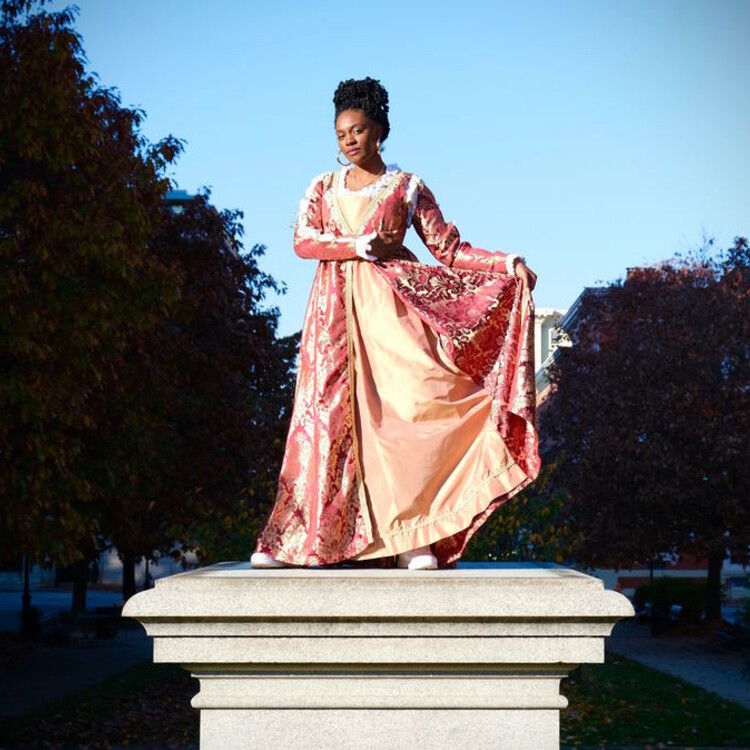
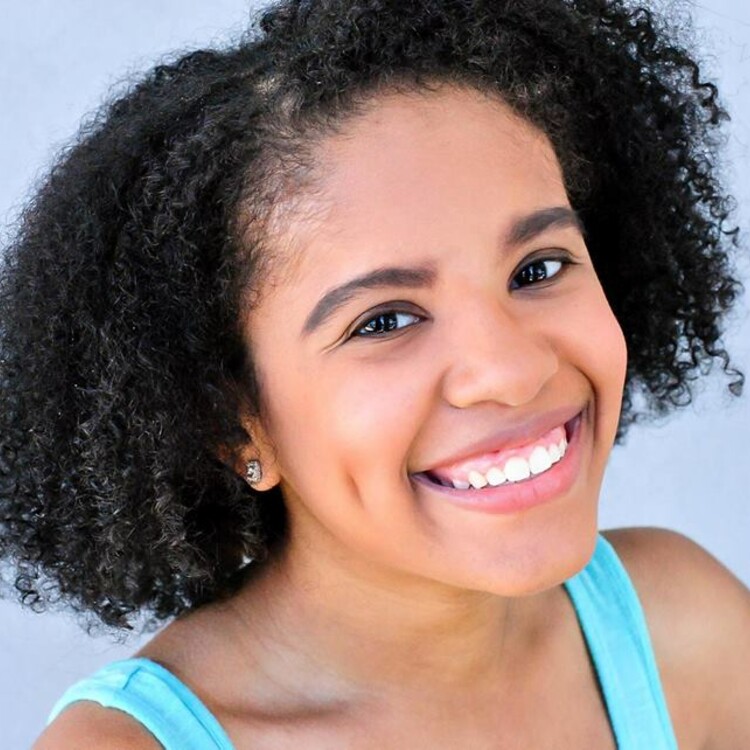
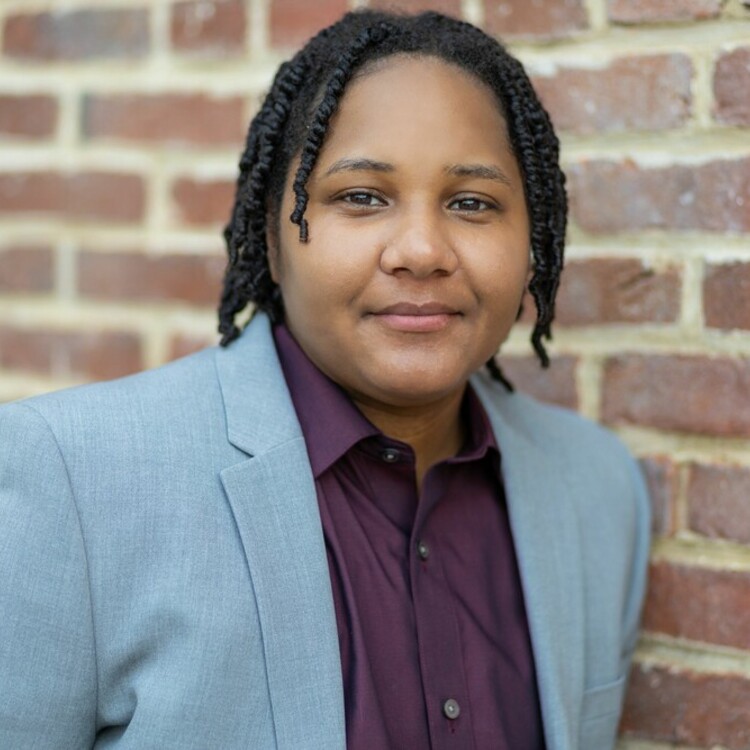
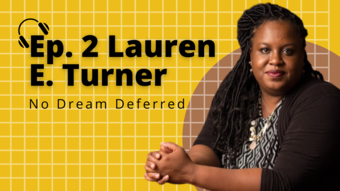


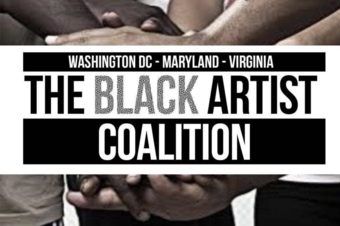




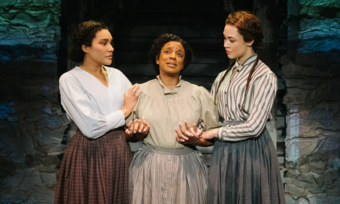
Comments
The article is just the start of the conversation—we want to know what you think about this subject, too! HowlRound is a space for knowledge-sharing, and we welcome spirited, thoughtful, and on-topic dialogue. Find our full comments policy here